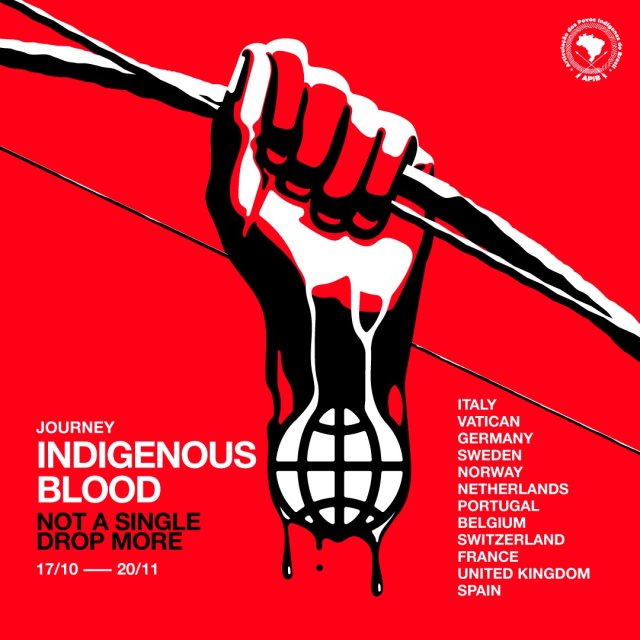A delegation of Indigenous leaders will visit 12 European countries between October 17 to November 20 to report serious violations against Brazilian Indigenous Peoples since President Jair Bolsonaro took office.
Led by the Brazil’s Indigenous Peoples Articulation - APIB, in partnership with civil society organizations, the campaign “Indigenous Blood: Not a Single Drop More” aims to pressure the Brazilian government and agribusiness companies to fulfill international agreements on climate change and human rights signed by Brazil - including the Paris Agreement, the International Labour Organization (ILO) Convention 169, the United Nations Declaration on the Rights of Indigenous Peoples, the New York Declaration on Forests, among others.
The delegation, formed by Sonia Guajajara, Nara Baré, Alberto Terena, Angela Kaxuyana, Celia Xakriabá, Dinaman Tuxá, Elizeu Guarani Kaiowá, and Kretã Kaingang, will seek important opportunities for dialogue and call upon European citizens to take impactful political actions and draw the world’s attention to the serious violations taking place in Brazil. They also aim to inform authorities and the public about the origin of Brazilian products produced in conflict areas or in Indigenous lands. According to the Indigenous leaders in the delegation, the agenda will be a campaign of dialogue, pressure, denunciation, dissemination, and awareness for European society about the situation that Indigenous Peoples are facing in Brazil, a reality that threatens the lives of forest peoples and the planet.
The journey will begin at the Vatican, with the presence of the Indigenous leaders at the Synod for the Pan-Amazon Region, inaugurated last Friday by Pope Francis, who has demanded respect for Indigenous cultures and rejected destructive or reductive “ideological settlements”. They will then travel to Italy (Turin, Bologna), Germany (Berlin, Munich), Sweden (Stockholm), Norway (Oslo), the Netherlands (Amsterdam), Belgium (Brussels), Switzerland (Geneva, Zurich, Berne), France (Paris), Portugal (Porto), the United Kingdom (London), and Spain (Madrid, Barcelona and Valencia). The agenda includes meetings with government authorities and political leaders, members of Congress of the European Parliament and Green party members, High Commissioners of International Cooperation, business people, international courts, activists, environmentalists, and artists.
Last April, data from an APIB report, produced in partnership with Amazon Watch, showed how European and US companies, including banks, logging companies, and leather makers, finance deforestation in the Amazon region. The research analyzed Brazilian companies fined for environmental crimes in the Amazon since 2017 and identified linkages between these and Northern countries’ commercial interests. There is evidence of these companies operating in conflict areas and extracting resources from Indigenous territories.
Preliminary data published in September by the Indigenous Missionary Council (Cimi) indicates that invasions into Indigenous territories exploded in 2019. Intruders, often heavily armed, enter the Indigenous lands to illegally mine, log or otherwise destroy or extract resources. From January to September, there were 160 invasions in 153 Indigenous lands, compared with 111 such cases in 76 territories in 2018. Within three months until the end of 2019, there is already a 44% increase in total attacks against indigenous territories and a 101% increase in land affected.
Another recent report, published by Human Rights Watch, showed how an action by criminal networks is driving deforestation and fires in the Amazon, showing that the reduced environmental inspection happening under the Bolsonaro government encourages illegal logging and results in greater pressure on forest peoples, who suffer violent reprisals in defending their territories.
In August, an Intergovernmental Panel on Climate Change (IPCC) report recognized the role of Indigenous Peoples as guardians of the forest and their contributions to climate solutions, as their knowledge and practices are important to climate resilience.
For APIB, the moment to amplify these facts through a campaign of articulation and communication abroad is now – because the genocide against Indigenous peoples in Brazil is real, and they need to join forces with allies in this battle for life.
To follow the campaign “Indigenous Blood: Not a Single Drop More” in Europe, follow APIB, Mídia Ninja and [Mídia Índia→https://www.instagram.com/midiaindiaoficial/] on social media.




